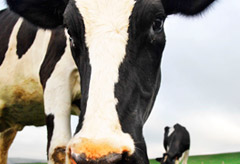Should scientists ‘humanise’ cow milk?
Scientists have created genetically modified cattle that produce human breast milk in the wake of the latest developments in GM foods

Scientists have created genetically modified cattle that produce human breast milk in the wake of the latest developments in GM foods
Babies could soon be fed on human milk produced by cows, offering mothers an alternative to instant formula often criticized for being inferior to breast milk.
The scientists behind the research bred 300 cattle that had been given human genes to make their milk contain the same important nutrient and fat content as breast milk. They hope that genetically modified dairy products from herds of similar cows could one day be sold in supermarkets.
Professor Ning Li, who led the research at the China Agricultural University, insisted the GM milk would be as safe to drink as milk from ordinary dairy cows and has the backing of a major biotechnology company. The move, however, has been condemned by campaigners questioning its safety.
‘There could be incredible risks with these products that we don’t know about,’ says Patti Rundall of Baby Milk Action. ‘Cows milk is never going to be like breast milk because it is species specific so we need to have rules in place to safeguard human health.’
Writing in the journal Public Library of Science One, Prof Li’s team say they used cloning technology to introduce human genes into the DNA of Holstein dairy cows, claiming they boosted the milk’s fat content by a fifth and changed the composition to make it close to that of human milk.
But a spokesman for the RSPCA says the creation of GM cattle is bad for animal welfare. ‘Offspring of cloned animals often suffer health and welfare problems, so this would be a grave concern.’
Marie Claire Newsletter
Celebrity news, beauty, fashion advice, and fascinating features, delivered straight to your inbox!
China’s rules on GM food are more relaxed than those in Europe and would not be allowed on sale in Britain unless it was approved by the European Union and passes stringent safety tests. However, some British scientists claim the research could be beneficial.
‘Genetically modified food, if done correctly, can provide huge benefit for consumers in terms of producing better products,’ says Prof Keith Campbell from Nottingham University.
What do you think about these latest developments? Would it be beneficial for mothers and their children to have breast milk available on the shelves, or have scientists taken genetic modification a step too far? Have your say by posting a comment below.
-
 The 10 best dresses celebrities from Tiffany & Co.'s Blue Book 2025 Gala
The 10 best dresses celebrities from Tiffany & Co.'s Blue Book 2025 GalaCelebrating the brand's marine-inspired collection
By Sofia Piza
-
 These are the 11 cult designer buys of spring 2025—and they're already selling out
These are the 11 cult designer buys of spring 2025—and they're already selling outFrom Miu Miu's must-have cowboy hat to Loewe's latest bag
By Clementina Jackson
-
 Prince William and Princess Kate have announced their 14th wedding anniversary plans
Prince William and Princess Kate have announced their 14th wedding anniversary plansBy Jenny Proudfoot